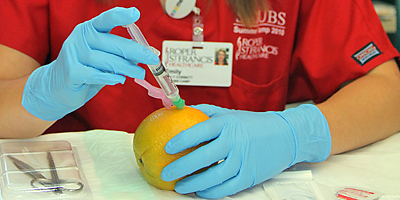
 CHARLESTON—With a steady hand and a firm grip on the scalpel, Emily Corbett made a small incision in the liver, then quickly cauterized the bleeder.
CHARLESTON—With a steady hand and a firm grip on the scalpel, Emily Corbett made a small incision in the liver, then quickly cauterized the bleeder.
Her instructor nodded approvingly.
“That’s it,” said Nalani Kalawe, “See how fast it [the cauterizing tool] gets hot? See the smoke when you hold it there? It only takes a second.”
Kalawe, a surgical technician at St. Francis Hospital, was showing a group of students in the SCRUBS program the basics of surgery.
Don’t worry, they weren’t practicing on people.
Using donated animal parts, the 22 teenagers cut into livers and stapled up wounds. They also x-rayed broken legs, set them, and wrapped them in cast material.
“I never thought I’d be casting up a chicken foot,” Emily said with a smile.
A sophomore at Bishop England High School, she heard about the program from her mom, Beth Kennerty, who is a guidance counselor at C.E. Williams.
SCRUBS, which stands for Students Can Really Use Bedside Skills, is a mentoring initiative at Roper St. Francis Healthcare designed to give teens hands-on experience in hospital work.
Joan Perry, RN, director of volunteers at Roper St. Francis and head of the program, said it has been in operation for four years and earned an award for excellence.
The three components include a weeklong summer camp, quarterly SCRUBS “U” sessions and a mentoring program for youth 16 and up.
They are all interactive, fast-paced and fun, said Perry.
At the camp session held June 21-25, students at the two hospitals were taken under the wings of nurses from a variety of medical fields.
“These nurses compete to give them the best experience,” Perry said. “The staff is just so enthusiastic about making this work.”
In just one day, the youth quizzed a psychiatric nurse, experienced the ins and outs of an emergency medical vehicle, witnessed surgeries in the operating room, and toured the emergency room.
They took blood pressures, performed laparoscopic surgery on practice models, gave shots to oranges, and stitched up chickens — well, parts of chickens.
 For teens who have grown up in an age of advanced video games, laparoscopic surgery was surprisingly easy; but old-fashioned stitching, not so much.
For teens who have grown up in an age of advanced video games, laparoscopic surgery was surprisingly easy; but old-fashioned stitching, not so much.
“I hope I don’t have to sew anyone up for real, they may bleed to death,” Emily quipped.
The sophomore said she hopes to be a neo-natal nurse one day. Samantha Safa, a freshman at Bishop England, also plans to go into nursing. Other students in the program listed goals such as specialized surgery, emergency room medicine, and psychiatric care.
The instructors nodded encouragingly, but cautioned the youth to remain open to alternate medical paths.
The five-day camp tries to provide a sampling of everything a hospital has to offer.
“The overall goal is to show them what a career in health care would be like,” said Caroline Pate, media relations manager for Roper St. Francis Healthcare.
St. Francis and Roper are the only two S.C. hospitals to offer SCRUBS and students come from all over the state to participate.
Perry said they had 45 teenagers at the two sites this year, with over 60 applicants, some from as far as Texas. To qualify, students must write an essay and have a teacher’s recommendation.
She said the program looks good on a resume, especially if instructors can vouch for a student as being eager and motivated.
That shouldn’t be a problem for the group at St. Francis.
Every time an instructor asked a question or called for a volunteer, all the hands went up. And when it was their turn to ask questions, they were thoughtful and interesting.
As the session wound down for the day, the teens talked amongst themselves about the best parts and wrote thank you notes to the many medical professionals who gave them such a great experience. On this day, most said they enjoyed the surgeries best.
Kisha Penn, RN, patient care coordinator for the hospital operating room, was able to find two procedures for the students to watch.
Emily said seeing an operation was interesting, and she was comforted by how relaxed the doctors were.
But what she was really looking forward to, as were many of the girls in the group, was the final day: a rotation on the obstetrics floor where they handled a placenta and umbilical cord, among other things.
Both Emily and Samantha said it was a whirlwind week of activities, and they found everything interesting. One of the sessions they both named as a favorite was the health labs at Trident Technical College.
The girls said they took vital signs and interacted with “patients,” otherwise known as state-of-the-art, lifelike, human simulator mannequins.
Samantha said they breathed, talked, and had all the bodily functions of a real person.
“It’s been a really good experience because you got to see everything,” Emily said.
